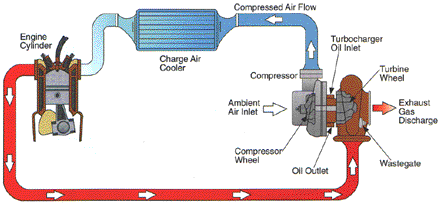Nice diagram bro! Btw, the diagram is a bit unclear on what drives the turbo (turbine)? The hot exhaust gas. The turbine is connected to the compressor via a shaft, when the turbine spins, the compressor then spins and compresses the air from the intake. (I stand corrected, but hopefully this is still valid from what I've learned in my final year 10+ years ago)

Sorry my last sentence was meant to say:
Cooler exhaust gas ---> Less heat transferred to the turbocharger while spinning the turbine ---> Less heat transferred to the oil while cooling the turbos ---> Lower oil temp
Anyway heat is very subjective, the exhaust gases passing through the turbine section of the turbocharger can vary from 450°C to as high as 1000°C in extreme conditions. So imagine that under our closed hood, confined space and hot weather. How it will affect the overall engine temp without additional cooling. Again I'm just saying I got better oil temps after upgrading to a huge intercooler. That's all, don't have to agree with me or we can agree to disagree! Cheers and enjoy your D's. Peace out, this is no place for a petrolhead like me



